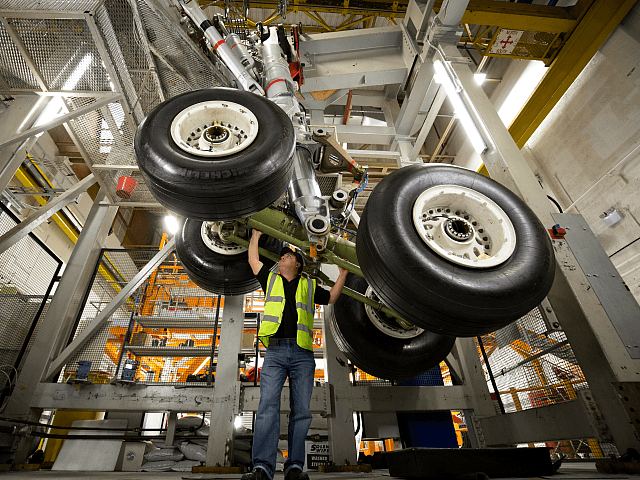Britain’s post-referendum economy is still going strong, despite dire predictions and constant negativity from the Remain campaign and EU loyalists in the mainstream media.
ADS Group, the aerospace industry trade body, have released figures showing global aircraft deliveries achieved a new annual high and their seventh year of consecutive growth, boosting the British economy by £29 billion.
“International demand for new aircraft continues to rise and manufacturers are stepping up production to satisfy airline requirements for cleaner and more fuel-efficient planes,” beamed ADS chief executive Paul Everitt.
“Our aerospace industry is playing a vital role in this global industry, producing wings, engines, landing gear, fuel systems and avionics for some of the world’s most successful commercial aircraft… Aerospace is spreading prosperity and creating high-value jobs in communities in every part of the country.”
Rail manufacturers, meanwhile, are enjoying what has been described as a “rail renaissance”, despite the industry appearing to be on its last legs in 2011, when Britain was firmly embedded in the EU with no obvious prospect of ever leaving.
£13.8 billion is being invested in some 7,000 new carriages, which should enable 6,400 extra services every week by 2021 and deliver nearly £85 billion in additional economic benefits to the country, according to the Rail Delivery Group.
Many of the carriages will be constructed in Britain, with Bombardier announcing it will be building hundreds of electric carriages at its plant in Derby in late 2017.
Earlier this month, pictures emerged of a brand new train and tram building plant in Newport, South Wales, for the Spanish firm Construcciones y Auxiliar de Ferrocarriles (CAF), expected to create 300 jobs.
Talgo, another Spanish firm, has also declared its intention to open a plant in Britain; French firm Alstom opened a new train modernisation facility in mid-2017, and Hitachi’s assembly line in Newton Aycliffe is going from strength to strength.
Prospects for Britain’s booming car industry also remain positive, despite EU loyalists and establishment media outlets like the BBC trumpeting a small 1.1 per cent dip in 2017 exports following a bumper 2016.
British factories produced 1.67 million cars, the country’s second-biggest output for 17 years, and engine output rising by 6.9 per cent to a record-breaking 2.7 million.
Export prospects beyond the European Union appear bright as the country gears up to reclaim control over trade policy after Brexit, with exports to Japan surging by 25.4 per cent, exports to China up 19.7, per cent, and Canada 19.5 per cent.
Demand in the United States, which is already the British car industry’s single biggest customer, is also increasing, with exports up 7 per cent — and likely to increase further if the “very big, very powerful” trade deal which the Trump administration wishes to strike with Britain is made.
Some partisan actors have attempted to paint a decline in domestic consumption as Brexit-related, but this appears unconvincing, given monthly domestic sales were still setting new records in 2017, long after the referendum.
A more likely culprit is the new taxes and regulations on diesels following the Dieselgate scandal in Europe — attributed in large part to European Commission “negligence”.
Industry leaders say the announcement of a ban on diesel and petrol cars and vans from 2040 has also helped to scare customers away.

COMMENTS
Please let us know if you're having issues with commenting.